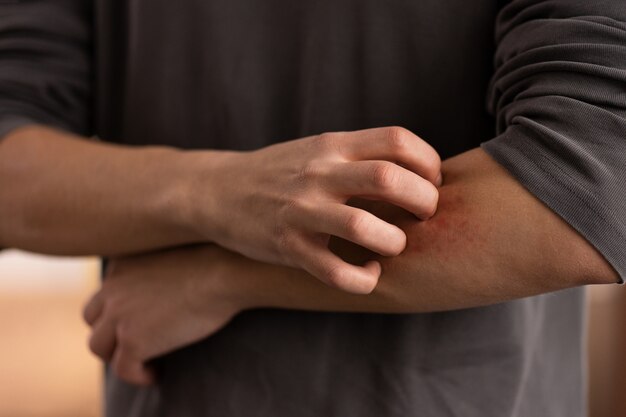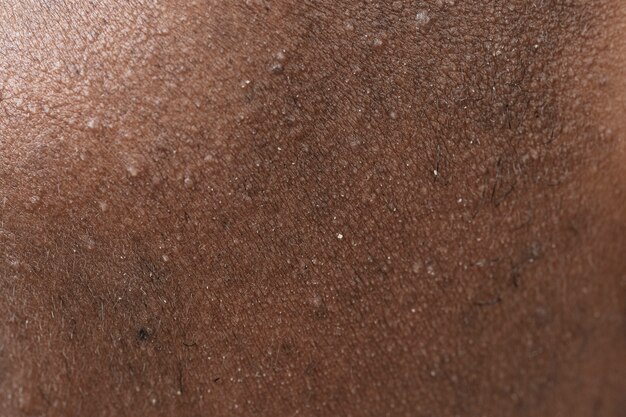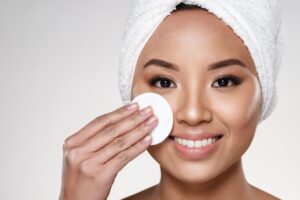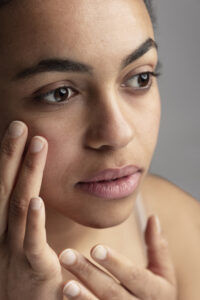Eczema can be frustrating, ruining the beautiful skin that we’ve worked so hard to maintain.
But here’s the thing: while eczema may feel unpredictable, understanding what’s happening beneath the surface and finding the right care routine can put you back in control.
So, what is eczema? And how can you spot the symptoms and triggers of this skin condition?
Let’s find out!
What is Eczema?
Eczema, also known as atopic dermatitis, is a chronic condition in which the skin barrier struggles to do its job. When this happens, moisture escapes and irritants sneak in, leading to dry, itchy, and often inflamed skin.
And the cause? Well, the exact cause of eczema remains a bit of a mystery. Eczema flare-ups can feel like they come out of nowhere, but experts believe it’s a mix of genetics, environmental factors, and an overly sensitive immune response.
So here’s a quick rundown of common triggers that could make your skin freak out.
Weather/ Environmental factors
Changes in weather, particularly cold and dry air, can strip moisture from the skin, triggering eczema. Hot or humid conditions can also worsen symptoms by leading to sweating, which can irritate sensitive skin.
Using the wrong products
Your daily shower routine could set you up for disaster, especially if you use harsh soaps or scented body washes. This is because everyday products like soaps and detergents, which contain fragrances, dyes, and other irritants, can damage sensitive skin and are particularly problematic.
Allergens
Eczema is often linked to allergies. Common allergens like pollen, dust mites, pet dander, and certain foods can trigger a flare-up faster than you know it. And It’s not just about sneezing and watery eyes; these allergens can make your skin react.
Stress and Hormonal changes
Emotional stress doesn’t directly cause eczema, but it can trigger or worsen flare-ups. Stress also releases certain hormones that can affect the immune system and inflame the skin.
Hormonal changes can also be responsible. For some, changes in hormone levels, like during pregnancy, menstruation, or menopause, can lead to flare-ups or make existing eczema worse.
Sweating and Overheating
Overheating and excessive sweating from exercise or hot showers can irritate the skin, leading to itching. Exercise or just living in a hot climate can also lead to excessive sweating, which may consequently cause itching.
Although not common, some people may notice that certain foods, like dairy, eggs, or nuts, can worsen their eczema. If this is you, then avoiding these foods is probably best.

Symptoms of Eczema
Eczema is a chronic inflammatory skin condition characterized by dry, itchy patches that can become red, inflamed, and sometimes blistered or scaly. Persistent itching is also a symptom, and it is probably the hallmark symptom of eczema.
So here’s a list of symptoms to look out for;
- Dry, sensitive skin
- Red, inflamed patches
- Thickened skin
- Bumps
- Skin discoloration
Thickening here often results from scratching, leading to lichenification, where the skin thickens and becomes leathery. Also, when small bumps appear on eczema areas on the skin, they may ooze fluid when scratched, leading to crusting and scabbing.
Some people may also notice that they have hyper or hypopigmentation, which is when the eczema-affected area becomes darker or lighter than your natural skin tone, especially after prolonged inflammation.
Eczema can appear anywhere on the body but is most common on the hands, neck, inner elbows, and behind the knees. However, it often appears on the face and scalp in infants and young children.
Gentle cleansers and moisturizers for sensitive and Eczema-prone skin
Skincare plays a critical role in managing eczema; the right products can help maintain the skin barrier, lock in moisture, and reduce the risk of irritation. Products like this need to be as gentle as they are effective. So, the right cleanser should clean without stripping your skin’s natural oils, and your moisturizer should lock in hydration while supporting your skin barrier.

Below are some of the best recommendations for cleansers and moisturizers that are gentle enough for eczema-prone skin.
Gentle Cleansers
For eczema-prone skin, choosing a mild, fragrance-free cleanser is of the utmost importance. Harsh soaps can strip the skin of its natural oils, worsening dryness and irritation. So, look for cleansers that are designed to be hydrating and pH-balanced.
A good example is the CeraVe Hydrating Cleanser. This cleanser is highly recommended for those with dry or sensitive skin. It contains ceramides and hyaluronic acid, which help restore the skin’s natural barrier while providing hydration.
Another suitable cleanser is the Cetaphil Gentle Skin Cleanser. Cetaphil is known for its gentle, non-irritating formula. It cleanses without stripping the skin, making it ideal for daily use on eczema-prone skin.
There’s also the Aveeno Restorative Skin Therapy Soothing Body Wash. Infused with oat and provitamin B5, this body wash is designed to cleanse and calm irritated skin gently, making it a good choice for people with eczema.
Next up, moisturizers!
Moisturizers
Moisturizing is vital to managing eczema as it helps seal in moisture and reinforces the skin barrier, reducing dryness and flare-ups. It’s recommended to use thick creams or ointments rather than lotions, as they tend to be more hydrating.
One such cream is Vaseline Healing Jelly. As a simple, effective option, Vaseline provides a protective barrier to lock in moisture. It is also helpful for spot-treating areas that are particularly dry or cracked.
Another one is the Eucerin Eczema Relief Cream. This cream contains colloidal oatmeal and ceramides, which help soothe and protect irritated skin while providing long-lasting moisture.
And there’s the Aquaphor Healing Ointment. This multi-purpose ointment works well for sealing in moisture, especially in extremely dry areas. It’s also thicker than creams, making it suitable for dry or cracked skin.
Beyond using the right cleansers and moisturizers, there are also other steps you can take to help manage eczema. One of these is to take lukewarm showers. Hot water can strip the skin of its natural oils, leading to dryness and irritation. So, use lukewarm water and keep showers short.
Also, avoid rubbing your skin with a towel after bathing. Instead, gently pat your skin dry after bathing. This will help retain moisture. Additionally, try applying moisturizer while your skin is still slightly damp. This can also help lock in hydration.
Furthermore, you need to stay hydrated and eat a balanced diet. Drinking plenty of water and maintaining a diet rich in healthy fats can support your skin’s natural moisture levels, consequently reducing the occurrence of eczema.
Conclusion
Eczema might feel like a never-ending saga, but you can reclaim control with the right tools and knowledge. It’s all about knowing what triggers your skin, spotting symptoms early, and building a skincare routine that works for you.
Remember, what works for one person may not work for another, so finding the right routine may involve some trial and error.
However, the key is to keep your products as gentle as possible. Avoid harsh ingredients like fragrances, alcohol, or sulfates. And, of course, don’t forget to consult with a dermatologist when necessary. Professionals can provide tailored advice and help you better understand your skin’s unique needs.











